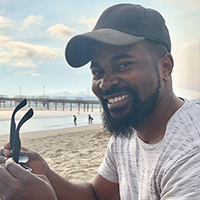Dan Eckhardt | Lead, Electric Propulsion

Air Force Research Laboratory, United States Space Force
Department: In-Space Propulsion Branch
Education: B.S. Applied Mathematics and B.S Electrical Engineering, Illinois Institute of Technology, Ph.D. Mathematics, Rensselaer Polytechnic Institute
Career stage: Mid
What do you do?
I lead a team of scientists and engineers in the research and development and sustainment of spacecraft electric propulsion technologies for the United States Space Force (USSF) and Department of Defense (DoD) customers, as well as other government agencies, industry, and various academic institutions. I’m also principal investigator (PI) on developing Verification & Validation (V&V) and optimization techniques used in various rocket technologies. On any given day I might be in the lab running experiments, in meetings with stakeholders, or collaborating with professors and their students on research topics. I find the breadth of the work I do very rewarding. Being at the bleeding edge of technology, there is always a new challenge to tackle, and that keeps me motivated.
What types of skills do you use?
The ability to write and speak concisely so I can pass on critical information to higher-ups is very important. Teamwork and time management are also essential, especially since we typically work on large projects where various specialists are contributing.
How are applied mathematics and/or computational science important to what you do?
I use applied mathematics and computational science in every aspect of my work. For example, as PI, I’m working with a team to develop computational techniques that leverage advances in data-driven work in order to better incorporate experimental campaigns with high fidelity physics models.
What are the pros and/or cons of your profession/job?
Pro: The continuous opportunity to learn. There is a lot of amazing work being done and having to keep up forces me to go outside my traditional field and learn different ways of approaching problems. Writing proposals for grants to pursue some of my ideas that may not necessarily align with what my job entails allows me to keep actively publishing and collaborating with academia.
Con: The bureaucracy of working for the government can be challenging, but there is concerted effort to reduce a lot of the unnecessary bureaucracy that stifles innovation.
Does your job offer flexibility?
My job offers growth and career broadening opportunities to explore and gain experience in other fields for months at a time, which allows one to grow and get a better perspective of different aspects of working for the DoD.
What career path did you take to your current position?
I began working for Air Force Research Laboratory (AFRL) through the National Research Council Postdoctoral Fellowship. I was interested in exploring plasma-related research outside of academia to gain a broader outlook on the topic. I ended up loving working for AFRL and I’ve stayed here since.
Was your career path well planned or a result of taking opportunities as they arose?
Definitely not well thought out; I intended to stay in academia, but I ended up in government in a field that’s only tangentially related to what I studied. I took (and continue to take) advantage of opportunities as they arose.
What advice would you give to someone pursuing a similar degree or profession?
My advice is to be open to jobs that might not obviously relate to your field of study. Networking is very important – go to conferences if you can and talk to people in careers you may not be interested in. You may be surprised how much you like what you hear. And as always, be open to experiences and learning new things.
Has SIAM played a role in helping you build your career?
We had SIAM Student Chapters at both Illinois Institute of Technology and Rensselaer Polytechnic Institute and participating in those activities allowed me to network—gaining both collaborators and mentors, present my research, and learn about new opportunities. SIAM has contributed to shaping both my academic and professional life.
Salary
Typical government salaries are available at opm.gov.
Back to List